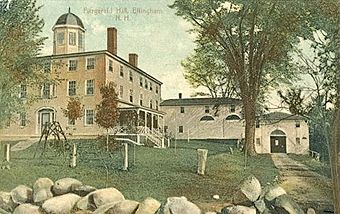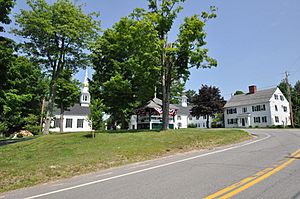Lord's Hill Historic District facts for kids
Quick facts for kids |
|
|
Lord's Hill Historic District
|
|

The Isaac Lord Mansion, 1908 postcard view
|
|
| Location | NH 153, Effingham, New Hampshire |
|---|---|
| Area | 31.9 acres (12.9 ha) |
| Architect | Multiple |
| Architectural style | Greek Revival, Georgian, Federal |
| NRHP reference No. | 85002162 |
| Added to NRHP | September 12, 1985 |
The Lord's Hill Historic District is a special old village in Effingham, New Hampshire. It sits on a hill along New Hampshire Route 153. This area is like a time capsule, showing us what a small rural village looked like in the late 1700s and early 1800s. The district is named after Isaac Lord, who was very important in helping the village grow. In 1985, it was added to the National Register of Historic Places, which means it's a place worth protecting because of its history.
Contents
Discovering Lord's Hill Historic District
A Glimpse into the Past
How the Village Began
The area known as Lord's Hill started to be settled in the 1770s. Its spot on a hilltop was perfect because it was along one of the main "range roads." These roads were laid out by early surveyors, like a grid for new towns. The village became quite important in the 1790s.
Isaac Lord: A Key Figure
Isaac Lord was a very influential person in the village. He built his large, fancy house in the Federal style. This was a popular building style in the early days of the United States. He also ran a tavern, which was a place where people could eat, drink, and stay. Isaac Lord helped make sure the town's meeting house was built in the village. A meeting house was a central building used for church services and town meetings. This helped the village grow even more.
Learning and Growing
In 1822, the Effingham Union Academy opened its doors. This was a school that helped educate the young people of the area. Today, the academy building is owned by a historical society. It helps us remember the village's past. Not much has changed in the village since the mid-1800s, which is why it's so well-preserved.
Exploring the District Today
What You'll Find
The historic district covers about 32 acres. It stretches along NH 153. You'll find it from the spot where NH 153 meets Plantation Road in the south. It then goes north to where NH 153 meets Hobbs Road. Both Plantation Road and Hobbs Road are parts of the old range roads.
At the southern meeting point, there's a small triangular park. Around this park, you'll see houses and important public buildings. These include the old academy and the church. Isaac Lord's big, stylish house is on the north side of NH 153. It's just east of the Hobbs Road junction. Most of the 21 buildings in the district are homes. There are also five small cemeteries, which are old burial grounds.
Old Buildings, New Look
The church in the district was built by Isaac Lord in 1798. It was later updated in the 1840s. That's when it got its current Greek Revival look. This style was inspired by ancient Greek temples, with columns and grand entrances. You can see how different architectural styles, like Federal and Greek Revival, shaped the look of this historic village.
 | Toni Morrison |
 | Barack Obama |
 | Martin Luther King Jr. |
 | Ralph Bunche |




